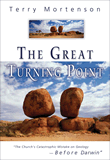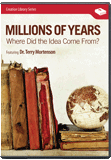Learning from “The Great Debate”
In this article I provide a sampling of the arguments used by Drs. Ankerberg, Ross, and Kaiser along with my commentary.
In early 2006 The John Ankerberg Show recorded ten (they aired eight) half-hour TV debates on creation and the age of the earth. These involved Ken Ham and Dr. Jason Lisle (defending the young-earth creationist view) and Dr. Walter Kaiser and Dr. Hugh Ross (defending the old-earth creationist view). Christians can learn much from watching this lively discussion moderated by Dr. John Ankerberg (who also clearly supported the old-earth view).
All ten programs (with my added running commentary) are now available from AiG in an illuminating set of DVDs called The Great Debate. Although the debate programs themselves have not been edited by AiG, my audio commentary at many points in each debate can be heard by clicking on an icon on the screen.
In my commentary I have supplemented arguments for the young-earth view. This was necessary because sometimes Ken or Dr. Lisle did not have the opportunity or time to give all the information they could have to refute points made by Dr. Ross or Dr. Kaiser. At other times Drs. Kaiser and Ross made technical arguments based on the Hebrew or Greek biblical text or on some point of science or history that required some additional research. And sometimes I reinforce a point made by Dr. Lisle or Ken or help the viewer observe “straw-man” arguments used against Ken or Dr. Lisle.
In this article I provide a sampling of the arguments used by Drs. Ankerberg, Ross, and Kaiser along with my commentary. The programs were transcribed verbatim in our office.
From Program 2: Length of Days in Genesis 1
Kaiser: Well, let me read from 1846, a theologian William G.T. Shedd. Still being reprinted by — Presbyterians and others — he taught but at — Andover for many, many years — he says “Respecting the length of a six created days, speaking generally, there are some differences of views between the Patristic and Medieval exegesis. But the Patristics and Medieval make them to be long periods, not days of 24-hours.
Mortenson: First, Shedd wrote this in 1846, at which time virtually the whole church had compromised with millions of years. See my book The Great Turning Point: The Church’s Catastrophic Mistake on Geology—Before Darwin and my PowerPoint DVD lecture Millions of Years: Where Did the Idea Come From? Shedd obviously had not done a careful study of the writings of the early Church Fathers or the Medieval church leaders. Shedd is badly mistaken and has misled Dr. Kaiser. Chapter 3 of the book Refuting Compromise by Jonathan Sarfati documents that the majority in the first 18 centuries of church history believed in literal days of creation about 6,000 years ago. Joseph Pipa and David Hall show in their book, Did God Create in Six Days? on pages 41–53, that the Westminster Divines of the 17th century were all young-earth creationists (YEC). And my book, The Great Turning Point pages 40–45, discusses the commentaries in use during the 18th and early 19th centuries to show that all the orthodox commentators were YEC at this time. In my review of Seraphim Rose’s book, it is clear that the Eastern Orthodox church fathers were also YEC until the 19th century when the millions of years idea took over science and the church.
From Program 3: The Impact of Sin on the World
Ankerberg: But — but here’s the thing for the people that are listening in — the fossil record seems to suggest that animals, plants died by the truck loads before Adam and Eve were even created. Ok?
Ham: An interpretation of the fossil record by certain people. [Ankerberg interrupts] Not the fossil record.
Ankerberg: I agree that that’s an interpretation but the fact is that’s what people see but what I want to get to is what do you base your conclusion on, that — that animals couldn’t have died before Adam and Eve?
Mortenson: Let’s be very careful and clear here. People have collectively seen billions of fossils in the rocks of the earth. It is fossils people see. The fossils themselves don’t suggest when they were formed. The idea that the animals and plants from which these fossils were made “died by the truck loads before Adam and Eve were even created” is an interpretation of the fossil record based on anti-biblical presuppositions or assumptions coming from the atheistic and deistic worldviews, as geology developed as a science in the late 18th and early 19th centuries. We must keep clearly in mind the difference between the observation of fossils and rocks and the interpretations of those observations based on assumptions. Observations, interpretations and assumptions are not the same thing and are not all facts. This very important point is addressed here and here.
From Program 5: Can We Trust Creation to Tell Us the Truth?
Ankerberg: … in talking about science, what does the Bible itself tell us about what God’s done in the record of nature. Can we trust that? And — Hugh, I want to start with a verse, ok, Psalm 19:1 says “The Heavens declare the glory of God, the sky’s proclaim the work of his hands, day after day they pour forth speech. Night after night they display knowledge.” What’s that saying, can we trust the record of nature? Does God tell us that from scripture?
Ross: I think he does and he does that in many other passages of the Bible as well. That the record of nature is trustworthy, it’s reliable, it’s part of the revelation that God has given to us. It’s a God that can’t lie or deceive. So just like with the words of the Bible, what we see in the record of nature is completely trustworthy and reliable and true.
Mortenson: Dr. Ross identifies no other Scriptures to support his claim and Psalm 19:1 doesn’t support his view either. That verse, along with Psalm 97:6, Job 12:7–10 and Romans 1:18–20, shows that the knowledge that the creation reveals is the knowledge of God’s existence and at least some of his attributes, such as His glory, His righteousness, His creative intelligence, His power, His eternality and His divine nature. And Romans 1 teaches us that creation reveals these things about God to a sufficient degree that people are justly condemned by God for not believing the witness of creation about the Creator. The Bible nowhere teaches or implies that we can work out the history of creation simply by studying nature, independent of God’s Word. Psalm 19:7–11 shows that the Word of God is far superior to the witness of creation. The Word makes us wise and enlightens the eyes; its testimony is sure and its judgments are true.
From Program 8: Noah’s Flood
Kaiser: John, again I think God’s going to hold us responsible just as in the — discussion of creation whether there was an absolute beginning and whether it came about through the mouth of God, so here the factor which not only in Genesis but later on in the New Testament in — Peter’s writings, it is all people save eight, it is universal with regard to humanity. Now I think as — believers we need to put on the shelf those things that we agree on and which are the main points of the text. The Flood was not given as a illustration for geology or for arguments of dates, it was given as God’s Judgment on humanity. That we must stress and that’s where the text stresses not only in Genesis but of course also in the New Testament. Whether it was local or universal, I don’t know. Why? Because the terminology used — is used consistently throughout the Bible since Christians generally just read the New Testament, let me show you some references there. Colossians 1:23 for example, as I recall — the gospel must be proclaimed to every creature — no the gospel has been proclaimed says Paul to every creature under heaven. That sounds like it’s all done, the great commission is over: Colossians 1:23. So if I’m going to use this same kind of — of — woodenness, I would call that not literal translation, I would call that wooden translation. The other thing is the word for earth, why is it throughout this whole narrative, doesn’t use eretz, it uses the word for the inhabited world — the text is specific at that point. Now the Bible could have used, the Holy Spirit and God the Father, could have said eretz. We translated it earth. But on the other hand, we don’t hold to an errancy of any translation. We hold to inerrancy of the Word of God in Hebrew, Aramaic, and in Greek. Therefore we’ve got a system of checks and balances. The word ought to be perspicuous and clear with regard to its main message so that even a plowboy could understand it. But yet like the checks and balances in the American government, so here too we also say, but our appeal must be to the original, so it must be explained to the laity but it also must have backing from the text here. Or Genesis 41:57: the famine was severe in all the earth — that was during the days — it’s about Moses writing again using a phrase with regard to — that which — Joseph had — a — sort of his under his — aegis at that point so I think that for a number of reasons — we ought to keep on affirming — the immutables. And the immutable in this case is all people, save those eight — Mr. and Mrs. Noah, their three sons and their wives — that was it, no one else survived and — none of the vertebrate — survived, they were on the Ark. Now the other question (Ham interjects: “Can — can I jump, can I jump in there, Walt?”) then how far should it go? That I think we ought to keep discussing and — be kind with each other, keep on thinking that perhaps we may have not gotten all the information.
Mortenson: Dr. Kaiser says that he doesn’t know whether the Flood was local or global. Why? Because 1) Dr. Kaiser hasn’t paid careful attention to the inspired, inerrant text that in his own writings he argues is historical narrative, and 2) because he has several false lines of reasoning in this statement. . . . [Below I have omitted my first and third points in my commentary on the DVD for sake of brevity.]
Second, Dr. Kaiser makes a false dichotomy when he says that “the Flood was not given as a illustration for geology or for arguments of dates, it was given as God’s judgment on humanity.” He is reasoning that since the Flood was a divine judgment on humanity that it could not also be a judgment on the physical earth and therefore be relevant to geology and the age of the earth. Why can’t it be both? There is no biblical or logical justification for this false dichotomy. It is not either the judgment of man or a geologically significant event, but rather both the judgment of man and a geological event. Like Dr. Ross, Dr. Kaiser seems to think that the Flood was only intended to destroy man. But as Genesis 6:7 and 13 clearly state, the purpose of the Flood included the destruction of the surface of the earth, which certainly is relevant to geology. Also, simple logic tells us that a year-long Flood would cause an unbelievable amount of sedimentation and erosion that would make the mudslides in the raining season in California, Hurricane Katrina and the tsunami that hit the south Pacific in late December 2004 look like Sunday school picnics on a sunny day. The Hebrew words in Genesis 7:11, which Dr. Kaiser has apparently not examined carefully, reveal the violence of the Flood which unquestionably implies tremendous geological effects. The verse says “the fountains of the great deep burst open.” Careful attention to the use of these words in the rest of Scripture shows that this phrase testifies to volcanic and earthquake activity all over the earth, especially on the ocean floor, during the Flood. A look at a map of the present ocean floor reveals many earthquake fault lines and volcanic cones. Such movements of the crust of the earth would trigger many, many tsunamis simultaneously around the world producing incredible erosional and sedimentary consequences. . . .
But, fourth, the biggest problem with Dr. Kaiser’s comment here relates to the Hebrew word translated “earth” in the Flood account of Genesis 6–9. Dr. Kaiser says that the Hebrew word, eretz, which is translated as “earth” in Genesis 1:1, is not used at all in the Flood account, but rather the word that means “the inhabited world.” He doesn’t say, but presumably he means the word adamah. According to the Hebrew lexicons, its primary meaning is not “the inhabited world” but rather simply “land” or “ground.” Concerning these two words Dr. Kaiser says, “the text is specific at that point.” It is a great sadness to me to have to say that he obviously didn’t examine his Hebrew Bible before he made this statement. In the Flood account, from Genesis 6:5–9:17, the word eretz is used 45 times! The word adamah is only used 9 times and is always translated as “land” or “ground” (not “the inhabited world”). Anyone with an interlinear Hebrew-English Bible can see this. Ken, Dr. Lisle and I are not using a “wooden translation.” We are paying careful attention to the inspired text. The Holy Spirit is most definitely telling us that the Flood was global and, as Dr. Kaiser truly said, God will hold us responsible for believing what He said through Moses. May God help us all to pay careful attention to His most holy Word.
I hope this sampling whets your appetite to listen to the whole series of debates by four of the leading experts in the church on this controversial subject of the age of the earth.
I encourage you to get The Great Debate DVD set. You, your family and friends will learn much about thinking carefully and biblically. It will sharpen your mind to discern the difference between assumptions, observations and interpretations of observations. And we hope and pray that it will deepen your confidence in the inerrant Word of God, particularly when claims are made which seem to contradict the Bible’s plain teaching (regardless of the credentials of the person making those claims). Check everything against the Word of God (Acts 17:11).
Recommended Resources

Answers in Genesis is an apologetics ministry, dedicated to helping Christians defend their faith and proclaim the good news of Jesus Christ.
- Customer Service 800.778.3390
- © 2024 Answers in Genesis








